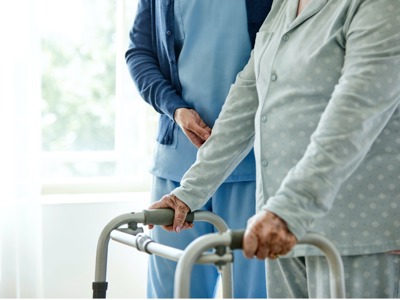
John’s Campaign, Care Rights UK, and Patients Association to highlight pandemic failures in adult social care at Covid Inquiry
John’s Campaign, Care Rights UK and the Patients Association will be making submissions, asking questions of witnesses and giving evidence as the Covid Inquiry investigates the impact of the pandemic on the adult social care sector across the UK.
Posted on 27 June 2025
The three organisations are represented as Core Participants in Module 6 which is investigating the impact of the pandemic on the publicly and privately funded adult social care sector. Public hearings are taking place from Monday 30 June - Thursday 31 July 2025 at the UK Covid-19 Inquiry Hearing Centre, Dorland House, London, W2 6BU.
John’s Campaign, Care Rights UK and the Patients Association will ask the Inquiry to confront the long-overlooked crisis in social care, including breaches of human rights, underfunding, inadequate oversight, and the toll on unpaid carers which was compounded by failures in decision-making during the pandemic.
Over the course of the pandemic, the organisations provided support to thousands of people as they struggled to safeguard the care they or their loved one needed, as they tried to make sense of the ever-changing rules, and as they sought to ensure they could be with the person they relied on for essential care and comfort, including at the end of their life. They heard first hand of the grief, guilt and anger caused by the failures to listen to those who rely on care and their loved ones and adequately consider their needs.
As Core Participants, organisations are able to review evidence, make submissions to the Inquiry and suggest lines of questioning to be pursued at hearings.
John’s Campaign, Care Rights UK and the Patients Association have already submitted written opening submissions to the Inquiry in which they highlighted amongst a number of issues the disproportionate harm faced by people with dementia during the pandemic and the treatment of social care as an afterthought. They emphasised the lack of parity between social care and the NHS and the failure to recognise the need to treat health and social care as both interlinked and equal.
In their oral submissions, the organisations are highlighting the diversity of the needs and settings within the social care sector and the fact that care settings are people’s homes - a fact often forgotten by decision-makers during the pandemic. The organisations are also providing examples of stories they heard from those involved in adult social care during the pandemic who felt marginalised, overlooked, ignored and undervalued.
They are highlighting the need for the Inquiry to properly consider and assess amongst other things:
- Failure to ensure respect for equality and human rights: Guidance and restrictions frequently breached existing legal rights, causing unnecessary suffering.
- Failure to obtain and take into account views of people directly affected: People who rely on care, their families, and care organisations representing them were excluded from vital decision-making processes, contributing to flawed and harmful policies.
- End-of-life care: Thousands of people died without appropriate palliative care and/or the comfort of loved ones leaving families with lasting trauma and guilt.
- Inadequate monitoring, oversight, and regulation: Reduced inspections and absence of external oversight, including due to visiting restrictions on loved ones during the pandemic meant poor care practices went unchecked, with severe consequences for residents.
- Isolation from loved ones: Untold harm to physical and mental health was caused by denying access to essential care supporters.
- Unpaid carers: Millions of unpaid carers took on intensified roles without support, recognition, or resources, despite being critical to the survival of the care system.
Helen Wildbore of Care Rights UK is due to give oral evidence to the Inquiry on behalf of the three organisations on 29 July 2025.
Julia Jones, co-founder of John’s Campaign, previously gave evidence to Module 3 of the Inquiry in October 2024 on behalf of the three organisations.
Both John’s Campaign and Care Rights UK have also been represented as Core Participants at Module 2B, which concluded last year in Wales, examining decision making of key groups and individuals in the Welsh Government.
The Leigh Day team representing John’s Campaign, Care Rights UK and the Patients Association in Module 6 include human rights team partners Emma Jones and Tessa Gregory and solicitor Carolin Ott. Leigh Day has instructed Adam Straw KC of Doughty Street Chambers and Jessica Jones and Emma Foubister of Matrix Chambers.
Carolin Ott said:
“The voices of those most affected by the government’s pandemic response were too often ignored or silenced. This inquiry must face the uncomfortable truth that foreseeable, avoidable suffering and human rights violations occurred in care settings across the UK. The goal now must be to learn from those mistakes and to ensure social care is never again treated as an afterthought.”

John’s Campaign, Care Rights UK and Patients Association are Core Participants at Care Sector module of Covid Inquiry
John’s Campaign, Care Rights UK and the Patients Association will be represented as Core Participants as the Covid Inquiry investigates the impact of the pandemic on the adult social care sector across the UK.

John’s Campaign and Care Rights UK lawyers make closing arguments at Welsh Administration module of Covid Inquiry
Lawyers representing John’s Campaign and Care Rights UK have told the Welsh module of the Covid 19 inquiry that if there should ever be another pandemic, core decision making should put those needing care and those providing care, including older and disabled people, right at its heart.


